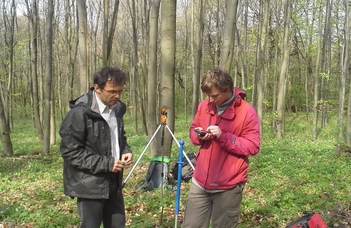
Department of Plant Systematics, Ecology and Theoretical Biology
| head of dept.: address: room: phone: fax: web page: |
Tibor Standovár habil. assoc. prof. 1117 Budapest, Pázmány Péter sétány 1/C., 7.5 (+36-1) 381-2187; (+36-1) 372-2500 /8087 (+36-1) 381-2188 plantsys.elte.hu/drupal/en |
|
Description of the scientific field
The department is home to a traditionally diverse community of scientists whose research spans several fields of science. The theoretical aspect of ecology focuses on the fundamental laws and interactions that shape the structure of biological communities, while the practical aspect involves the study of particular ecosystems and habitats, with respect to their organization, status, and changes over time, with increasing emphasis on the impact of human activity and the possibilities of conservation. Theoretical biology is defined, uniquely within biology, not by what it studies, but by the methods that it uses. It can involve the study of any living system that is sufficiently complex to warrant a specialized theoretical (conceptual or modelling) approach. Lastly, systematics is concerned with the theoretical foundations and practical application of the classification of living organisms, building largely on evolutionary theory. Teaching The department is responsible for the teaching of plant systematics and ecology, the flora of Hungary, biogeography, conservation biology and biostatistics, in the basic curricula of the BSc and MSc programmes in Biology and Environmental Science. In addition to theoretical lectures, students participate in field and computer courses to acquire practical skills. The department also offers a broad selection of optional courses (typically taught in small, interactive classes) in the fields of theoretical and applied ecology, evolutionary biology, and mathematical and computer modelling in biology. The department also contributes to the teaching of courses on best practices in research. Research Preserving a liveable natural environment in the face of increasing human population and anthropogenic effects is among the greatest challenges of the 21st century. Researchers of the department conduct long-term studies to monitor changes in the natural environment of Hungary, and perform controlled treatment experiments to predict how global warming and the expected increasing frequency of droughts and forest fires might affect natural vegetation within the country. They collaborate with experts in forestry to develop forest management practices aimed to maintain forests close to their natural state. Studies are often performed in the frame of international collaborations, giving rise to results of broad significance that go beyond the national level. The theoretical biology group at the same department studies fundamental problems of evolution: the origin and early evolution of life (RNA World, the origin of eukaryotes), the general laws and major transitions of evolution, the emergence of cooperation and language, the evolution of human behaviour, and the evolutionary background of diseases and the defences against them. They work with the complete toolbox of theoretical and computational biology: mathematical and computer simulations, complex data analysis, and formulating hypotheses based on literature mining. The group is international leader, publishing regularly in top-tier journals of the field. Finally, at the intersection of applied ecology and theoretical biology, there are also studies conducted in the modelling of ecological processes, and on the intermediate time scale of evolutionary ecology at the department. Research at the department is funded by the Hungarian Academy of Sciences; the National Research, Development and Innovation Office; the European Union; and the Swiss Contribution programme. Life at the department The department hosts two research groups of the Hungarian Academy of Sciences, effectively doubling the size of the unit, and contributing substantially to both the scientific output and teaching activities. Monthly group meetings provide a forum for informal progress talks, creating regular interaction between the researchers with widely varying interests. A productive research environment is further promoted by an extensive network of collaborations both inside the country (e.g. with the MTA Centre for Ecological Research) and abroad. Members of the department play an active organizing role in various public outreach (popular science lectures, Elevator Speech Contest) and talent promoting (Science Student Conference, Spring Schools) activities of the Institute of Biology. Career opportunities Research ecologists in Hungary find career opportunities at universities and in the research network of the Hungarian Academy of Sciences: the MTA Centre for Ecological Research consists of a number of research institutes in the country, specializing in various fields of ecology. Outside academia, graduated students can find employment in governmental (ministries, regulating bodies, national parks) and non-governmental organizations involved in environmental issues and conservation. Theoretical biology is also represented in the research institutes of the Hungarian Academy of Sciences, and the international renown and network of the theoretical group ensures broad career opportunities abroad. Furthermore, computational methods play an increasingly important role in biology, with applications also in biotechnology. How to get involved in ecology or theoretical biology? The MSc in Biology programme of Eötvös University (ELTE) includes a specialization in Ecology, Evolution and Conservation Biology, with a flexible curriculum that offers training in both ecology and theoretical biology. The simplest entry to the MSc training is provided by the BSc in Biology programme of the university. The two programmes have been designed to offer a seamlessly integrated, up-to-date framework of education in these fields, while taking the BSc at ELTE also provides opportunities for the students to get acquainted, in advance, with the topics and tutors that they will need to choose from for the research project required for the completion of the MSc. Finally, a career in research now requires also a PhD degree, which can be obtained in the ELTE Doctoral School of Biology, with dedicated programmes for both ’Ecology, Conservation Biology and Systematics’ and ’Theoretical and Evolutionary Biology’. How to find a student research project? You are advised to contact the researcher whose research topic you are interested in; see the list of e-mail addresses. |

